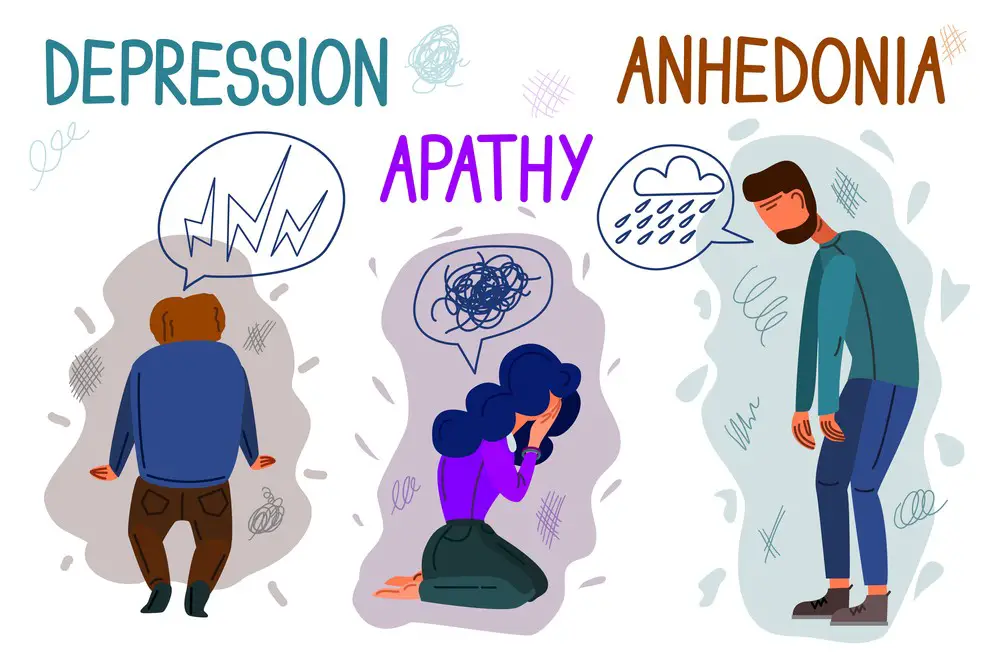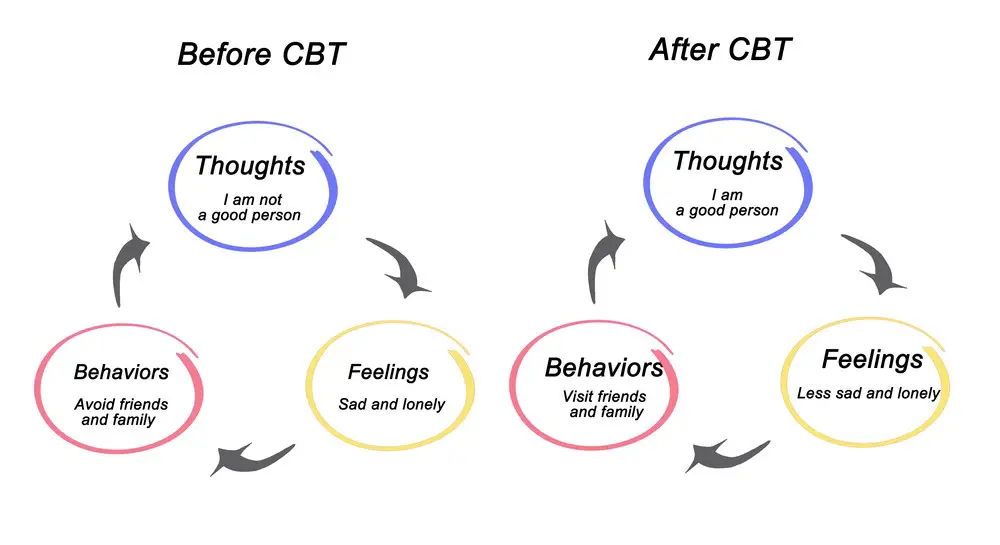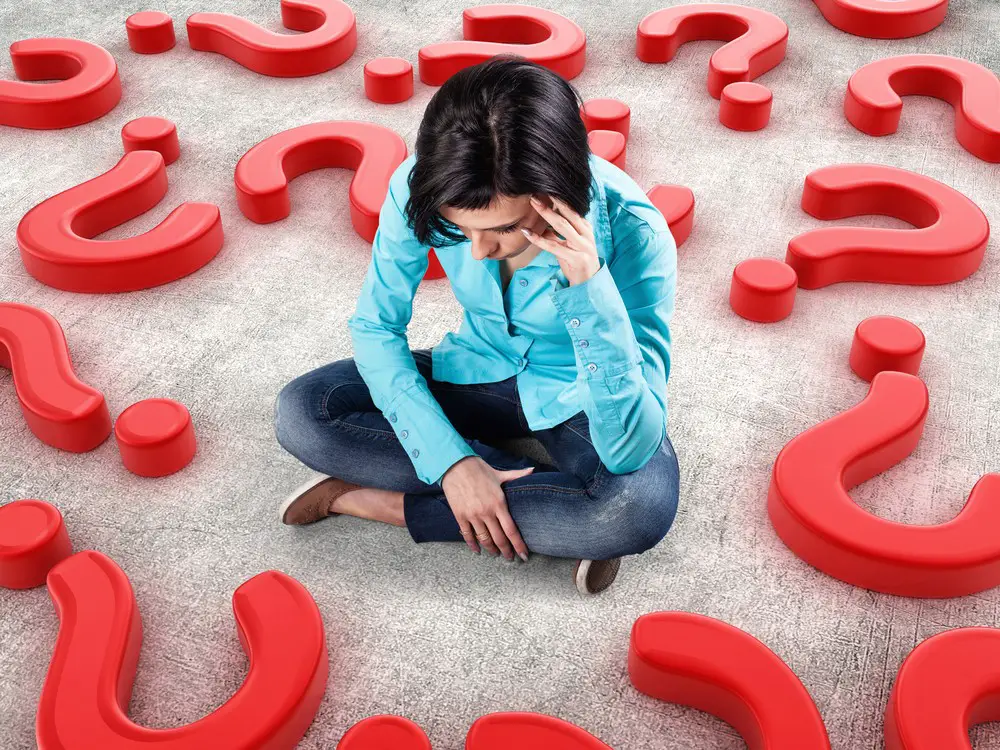As a BetterHelp affiliate, we receive compensation from BetterHelp if you purchase products or services through the links provided
Crippling depression is a severe and debilitating form of depression that significantly impacts an individual’s daily life. People who experience this level of depression often find it challenging to engage in routine activities, maintain relationships, and even carry out essential tasks such as personal care and maintaining their living spaces. The severity of the condition can vary from person to person, but it is crucial to understand the symptoms, causes, and risk factors to seek appropriate treatment and support.
Diagnosing and assessing crippling depression can be complicated, as it shares many common symptoms with other mental health conditions. Thorough evaluation by a mental health professional is key to determining the underlying cause and the most suitable treatment options. A combination of medication, therapy, lifestyle changes, and self-care practices can be effective in managing crippling depression and helping individuals regain their ability to function and enjoy life.
Key Takeaways
- Crippling depression is a severe form of depression that significantly affecting daily life and functioning.
- Accurate diagnosis and assessment by a mental health professional are crucial for determining appropriate treatment.
- A combination of medication, therapy, lifestyle changes, and self-care can help individuals manage crippling depression effectively.

Understanding Crippling Depression
Crippling depression, or major depressive disorder, is a debilitating and persistent mental health condition. It is a severe form of clinical depression that affects an individual’s daily life, making it difficult to carry out routine tasks. This section will discuss the essential aspects of this condition, providing a clear and neutral perspective on crippling depression.
The term “crippling depression” indicates this mental health condition’s severity and debilitating nature. It goes beyond the typical sadness or low mood experienced during difficult times. Instead, it manifests as an extreme and continuous emotional state that impacts a person’s ability to function in numerous areas of life.
Major depressive disorder is characterized by persistent sadness, hopelessness, and a lack of interest in previously enjoyable activities. This condition also affects cognitive and physical abilities, leading to difficulty concentrating, decision-making issues, and fatigue.
Severe depression can also accompany physical symptoms, as the mind and body are inherently interconnected. These may include changes in appetite, sleep disturbances, and aches or pains that cannot be attributed to any specific cause.
To diagnose crippling depression, mental health professionals must carefully assess the patient’s symptoms, medical history, and the duration and severity of those symptoms. This ensures that the diagnosis is accurate and distinguishes major depressive disorder from other mental health conditions, such as bipolar disorder or dysthymia.

Crippling Depression Symptoms
Crippling depression is a severe mental health condition that affects an individual’s emotional and physical well-being. It can disrupt daily functioning and significantly impact their quality of life. This section breaks down the emotional and physical symptoms of crippling depression.
Emotional Symptoms
Individuals suffering from crippling depression may experience a wide range of emotional symptoms, including:
- Persistent sadness: They may feel sad or down for most of the day, nearly every day.
- Loss of interest: They may lose interest in activities they once enjoyed, leading to social withdrawal.
- Feelings of guilt: Sufferers often experience overwhelming feelings of guilt, worthlessness, and helplessness.
- Anxiousness: Although depression is primarily considered a mood disorder, feelings of anxiousness and irritability are common.
- Suicidal thoughts: In extreme cases, crippling depression can lead to thoughts of self-harm or suicide.
Physical Symptoms
In addition to emotional symptoms, crippling depression can manifest in various physical forms, such as:
- Fatigue: Individuals may experience relentless fatigue, low energy levels, and the inability to carry out daily tasks.
- Sleep disturbances: Crippling depression can lead to sleeping too much or too little, resulting in insomnia or excessive sleepiness.
- Changes in appetite: Sufferers might notice significant changes in their appetite, causing weight loss or weight gain.
- Physical aches and pains: Unexplained headaches, muscle aches, or digestive issues often accompany crippling depression.
It is crucial to recognize the symptoms of crippling depression to seek appropriate treatment and support.
Causes and Risk Factors
Crippling depression, or major depressive disorder, is a complex mental health condition affecting millions worldwide. Numerous contributing factors can lead to the development of this severe form of depression. Understanding these elements can help individuals and professionals better recognize and manage the condition.
major depressive disorder, is a complex mental health condition affecting millions worldwide. Numerous contributing factors can lead to the development of this severe form of depression. Understanding these elements can help individuals and professionals better recognize and manage the condition.
One key factor in the onset of crippling depression is biological. Research indicates that imbalances in brain chemicals, specifically neurotransmitters, can play a significant role in the development and severity of depression. Genetics can influence these imbalances, which suggests a potential genetic predisposition to the disorder.
Stress is another significant contributor to the development of crippling depression. Chronic exposure to stress can interfere with the brain’s ability to regulate mood and emotional responses, potentially leading to the development of depressive disorders. Common sources of stress include traumatic events, relationship issues, work and financial pressures, and personal health problems.
There are numerous risk factors associated with the development of crippling depression. These elements can vary greatly between individuals, but understanding them can help identify those more vulnerable to the disorder. Some common risk factors include:
- A family history of mental disorders suggests a possible genetic predisposition
- The presence of other mental health conditions, such as anxiety disorders, bipolar disorder, substance abuse, or previous episodes of depression
- Chronic physical health problems, such as chronic pain, heart disease, and diabetes
It is essential to recognize that the onset of crippling depression is often multifactorial, meaning that it usually arises from a combination of interacting factors. The severity and duration of the condition can also vary significantly among individuals, making it crucial for healthcare professionals to consider each person’s unique situation when developing treatment plans.
Diagnosis and Assessment
To be diagnosed with crippling depression, an individual must undergo an assessment by a mental health professional or a doctor. These professionals play a crucial role in identifying the severity of the depression and determining the most appropriate treatment plan.
During the assessment, doctors and mental health professionals will reference the Diagnostic and Statistical Manual of Mental Disorders (DSM-5), which provides standardized criteria for diagnosing various mental health conditions. For depression, the DSM-5 lists symptoms such as persistent sadness, loss of interest in daily activities, and tiredness.
It’s essential to consider that individuals experiencing depression may exhibit different symptoms or experience varying intensity levels. Therefore, mental health professionals assess each case individually, ensuring the diagnosis is accurate and specific to the person seeking help.
Once diagnosed, a mental health professional will work closely with the individual to create a comprehensive treatment plan. This plan may include therapy, medication, or lifestyle changes, depending on the severity of the depression and the patient’s preferences. Regular follow-up appointments and ongoing communication with mental health providers are crucial for successfully managing crippling depression.
It’s important to note that early diagnosis and intervention are key to managing and eventually overcoming crippling depression. If you or someone you know might be experiencing symptoms of depression, don’t hesitate to consult a healthcare professional for support and guidance.
Treatment Options

Therapy
Various forms of therapy can be beneficial for those struggling with crippling depression. One effective method is psychotherapy, which encompasses a range of techniques and approaches. Among these, cognitive behavioral therapy (CBT) has proven particularly helpful. CBT involves identifying and challenging negative thought patterns, ultimately transforming them into more positive ones. Another type of therapy that can assist in treating depression is interpersonal therapy, which focuses on improving communication and relationships. Lastly, problem-solving therapy aims to equip individuals with the skills to tackle everyday challenges they may face effectively.
Medications
Medications can be another vital part of treating crippling depression. The most commonly prescribed medications are selective serotonin reuptake inhibitors (SSRIs), which balance serotonin levels in the brain, thus improving mood. A healthcare professional may prescribe these medications, and patients should work closely with their provider to determine the most appropriate treatment plan.
Electroconvulsive Therapy
For some individuals, electroconvulsive therapy (ECT) may be recommended as a treatment option for severe depression. ECT involves the application of small electrical currents to the brain while the patient is under anesthesia. This controlled procedure can provide rapid relief for those suffering from severe depression, although it may not suit everyone. It is crucial to discuss all available options with a qualified healthcare professional before deciding on any course of treatment.
Alternative Treatments
In addition to the mainstream treatments mentioned above, some individuals may seek out alternative treatments for depression. These may include:
- Meditation and mindfulness practices
- Exercise and physical activity
- Dietary changes aimed at promoting serotonin production
- Herbal supplements
Anyone considering alternative treatments must discuss their options with a qualified healthcare professional to ensure the chosen method is safe and effective for their unique situation.
Lifestyle Changes and Self-Care
When dealing with crippling depression, one can greatly benefit from making specific lifestyle changes and focusing on self-care. Managing depression often requires a holistic approach, and incorporating beneficial habits can significantly improve one’s mental well-being.
Eating well-balanced meals can help maintain energy levels and enhance one’s mood. Prioritizing nutritious food choices, such as fruits, vegetables, whole grains, and lean proteins, ensures the body has the necessary fuel to combat depression.
Sleep is another crucial aspect of managing depression. Establishing a regular sleep schedule and maintaining a comfortable sleep environment can improve sleep quality. Limiting exposure to screens, reducing caffeine intake, and creating a calming bedtime routine are some helpful practices for better sleep.
Regular exercise can also be a powerful tool in managing depression. Physical activities like walking, swimming, or yoga can release feel-good brain chemicals called endorphins. Setting realistic goals and choosing activities one enjoys for long-term adherence to an exercise routine is essential.
Joining a support group can provide a valuable sense of connection and shared experience. Meeting with others who understand the challenges of depression offers a safe space to share personal stories and coping strategies. Support groups can be found in-person and online, catering to various preferences and needs.
Making targeted lifestyle changes can enhance an individual’s ability to manage depression. These adjustments may include reducing stress, seeking enjoyable hobbies, or creating a soothing home environment. Prioritizing self-care practices, such as mindfulness, journaling, and spending time in nature, can create positive habits that contribute to mental well-being.
Adopting a combination of these strategies can help alleviate the symptoms of crippling depression and promote a healthier and more balanced life.

Professional Support
When dealing with crippling depression, it is critical to seek professional support. A psychiatrist or a psychologist can provide the necessary guidance and therapy to help individuals cope with depression. These professionals have the expertise to diagnose, treat and manage depression to help individuals improve their mental health.
One notable resource that can provide immediate assistance is the National Suicide Prevention Lifeline. This hotline is available 24/7 and provides confidential support to those in crisis or emotional distress. Reaching out to the Lifeline can be an essential first step for individuals suffering from severe depression. They can connect callers with local mental health professionals and support networks.
The National Institute of Mental Health (NIMH) also offers valuable information and resources for individuals suffering from depression. NIMH researches to advance scientific understanding of mental disorders and supports the development of innovative treatment options. They offer educational materials and resources to help individuals learn more about depression and find appropriate professional support.
In conclusion, seeking professional support is crucial for individuals suffering from crippling depression. Psychiatrists, psychologists, and other mental health professionals can play a significant role in diagnosing, treating, and managing depression. National organizations like the National Suicide Prevention Lifeline and NIMH provide valuable resources and support networks for those in need.
Other Related Mental Health Conditions
Persistent depressive disorder, also known as dysthymia, is a type of depression characterized by long-lasting, chronic symptoms. These symptoms may be less severe than those seen in major depressive disorder but can still significantly impact daily life. People with persistent depressive disorder frequently experience hopelessness, low self-esteem, and irritability.
Postpartum depression is a mental health issue that affects some women after giving birth. It is more severe and longer-lasting than the typical “baby blues” that many new mothers experience. It can include symptoms such as intense sadness, anxiety, and thoughts of harm to oneself or the baby. Prompt treatment is essential to protect both the mother and the infant.
Bipolar disorder is another mental health condition that may share similarities with depression. This condition involves periods of depression alternating with episodes of mania, characterized by abnormally high energy levels, impulsive behavior, and racing thoughts. Bipolar disorder is a lifelong condition that requires ongoing management and treatment.
It is important to recognize that depression and related mental health conditions are complex and multifaceted. The personal experiences of individuals with these disorders vary widely, and treatment approaches must be tailored to address their unique needs.
Frequently Asked Questions

Do I have crippling depression quiz?
There isn’t a specific quiz that can accurately diagnose one with crippling depression. However, individuals who suspect they may have this condition should consult a mental health professional for a proper assessment and diagnosis. It is crucial to seek expert advice instead of relying solely on online quizzes, as such quizzes may not cover all possible symptoms or take an individual’s unique circumstances into account.
Crippling depression symptoms
Crippling depression may manifest with various symptoms, including persistent sadness, hopelessness, fatigue, irritability, loss of interest in previously enjoyable activities, low self-esteem, and difficulty concentrating. These symptoms may interfere with daily functioning, challenging engaging in social, work, or family life. In severe cases, individuals may also experience thoughts of self-harm or suicide.
Crippling depression vs depression
The primary distinction between crippling depression and general depression is the severity of the symptoms and the impact on an individual’s ability to function in daily life. While both conditions share many common symptoms, crippling depression is considered a more severe disorder. It significantly impairs a person’s ability to carry out daily tasks or maintain healthy relationships, thus affecting their overall quality of life.
Crippling depression and anxiety
Crippling depression and anxiety often coexist, as they share similar symptoms and can feed into each other. Anxiety may exacerbate the sadness, despair, and worry experienced by those with crippling depression. In addition, individuals coping with crippling depression may develop anxiety as they grapple with the challenges brought on by their condition. It is essential to address both conditions during treatment for optimal recovery.
Is crippling depression curable?
There is no one-size-fits-all cure for crippling depression, but treatment options like medication, therapy, and lifestyle changes can effectively help manage the condition. Combining different methods often yields better results when alleviating symptoms and improving an individual’s overall well-being. Working closely with mental health professionals and engaging in ongoing treatment tailored to one’s unique circumstances and needs is crucial.
What is severe debilitating depression?
Severe debilitating depression, similar to crippling depression, is a persistent and intense form of depression that significantly impairs an individual’s ability to function in everyday life. The symptoms of severe debilitating depression interfere with a person’s capacity to engage in regular tasks, responsibilities, and relationships. Due to its severe nature, seeking professional help and adhering to a comprehensive treatment plan to manage this condition is crucial.
- 7 Ideas to Help You Relax and Unwind on a Family Vacation - April 27, 2025
- How Having Cybersecurity Protection Helps You Relax - April 25, 2025
- 8 Reasons Why Spending Time Outside Calms You Down - April 25, 2025
This site contains affiliate links to products. We will receive a commission for purchases made through these links.



